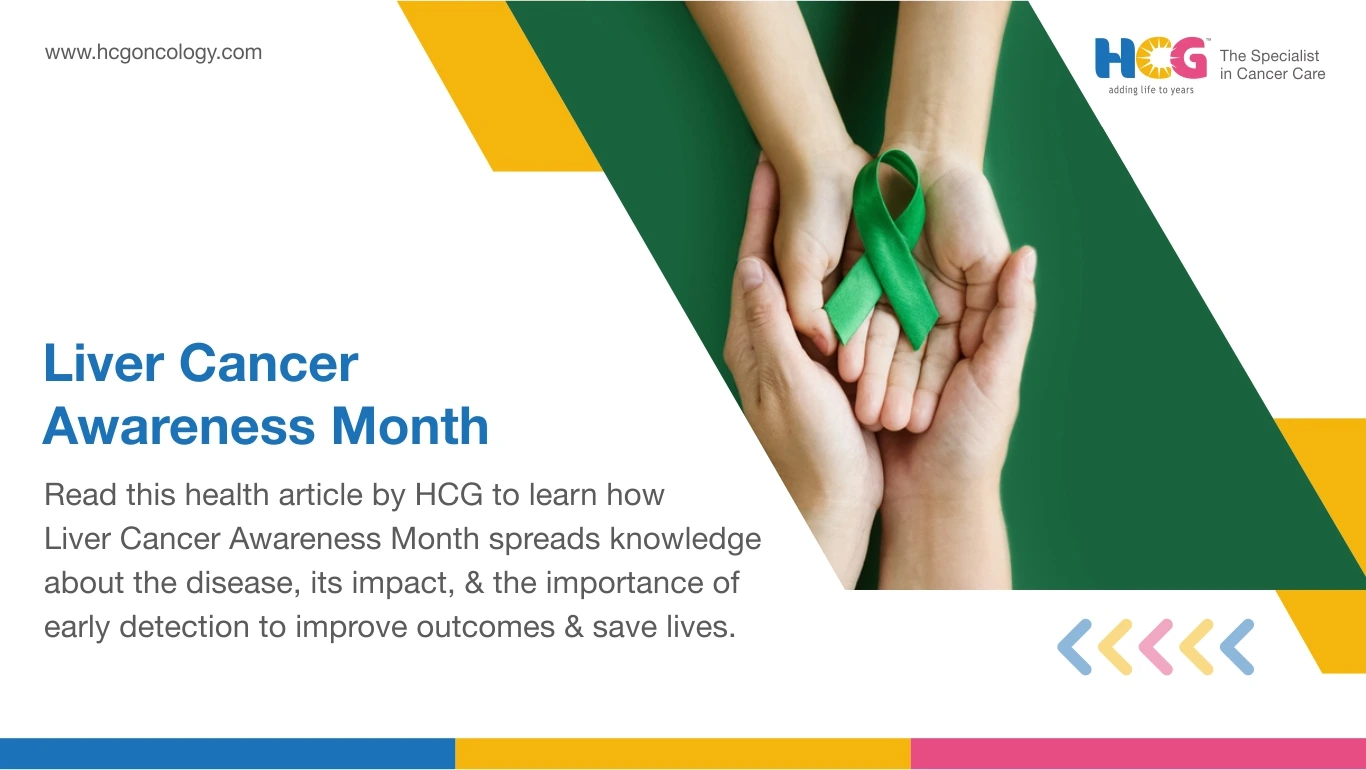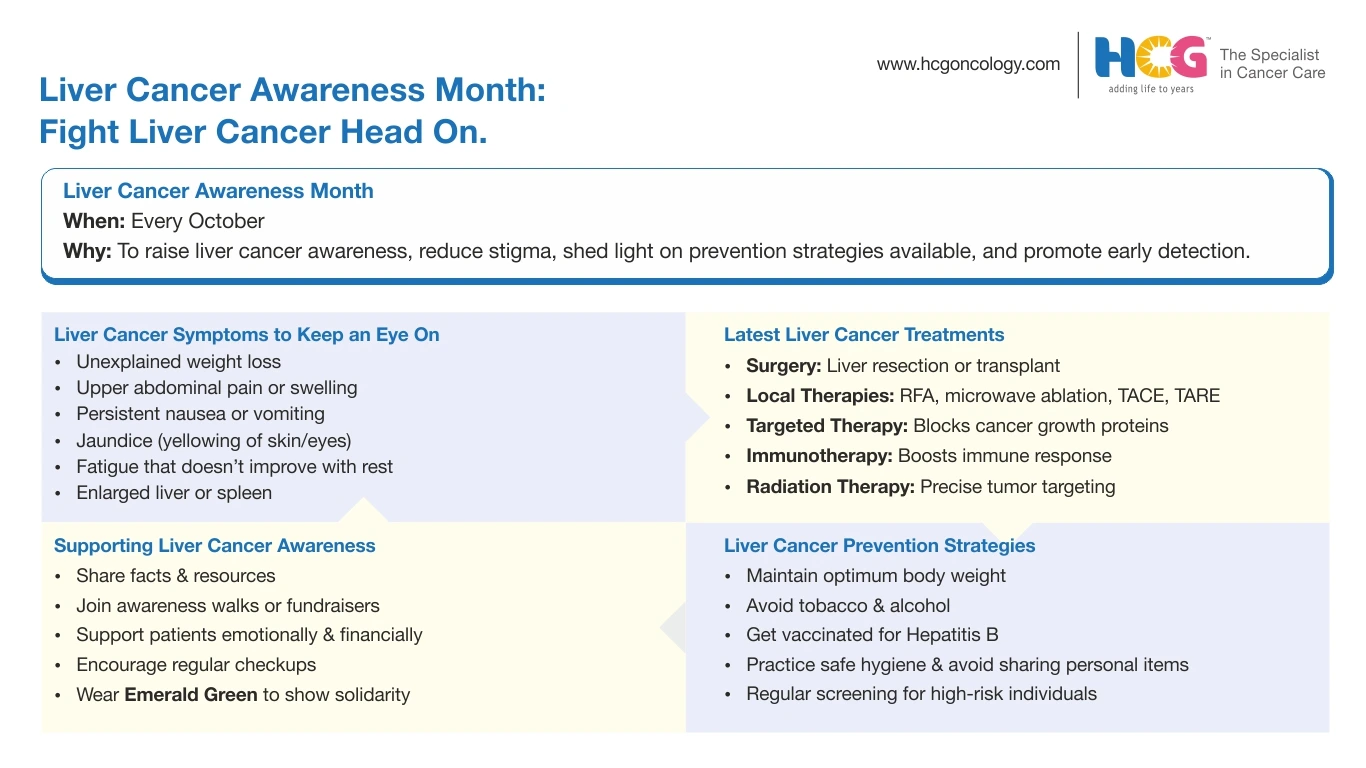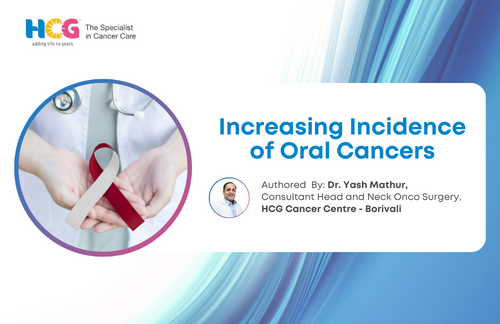
06 Oct, 2025

06 Oct, 2025

This article is medically reviewed by Dr. Chandrasekhar Prasad Singh, Consultant - Medical Oncology, HCG - Abdur Razzaque Ansari Cancer Hospital, Ranchi.
Did you know that liver cancer is one of the most easily preventable cancers?
You heard right. A large percentage of liver cancer cases are associated with modifiable risk factors, such as chronic hepatitis infection, excessive alcohol consumption, obesity, and smoking. It means you can somewhat control your chances of getting liver cancer.
However, despite being easily preventable, liver cancer is a frequently diagnosed type of cancer in our country, and it has a high mortality rate. Several factors may contribute to this situation, including a lack of awareness, limited access to modern treatment facilities in certain areas, and a general neglect of health issues, among others.
It is for this reason that many healthcare organizations and nonprofit organizations come together yearly to raise awareness about the crucial aspects of liver cancer.
In India, October is recognized as Liver Cancer Awareness Month or Liver Cancer Month.
During this month, many healthcare organizations, NGOs, and health advocates strive to raise awareness about the symptoms, risk factors, and preventive strategies for liver cancer.

Liver Cancer Awareness Month focuses on providing information about liver cancer. During this month, several patient advocacy organizations, government health bodies, and healthcare organizations disseminate information related to various aspects of liver cancer, including its incidence rate, risk factors, common symptoms, several treatment options, and helpful preventive strategies.
Learning about this disease lowers the stigma associated with it, providing necessary information about various treatment options available and encouraging timely treatment.
Knowing about the different signs and symptoms of liver cancer is crucial for individuals to know when to seek medical attention.
The following are some of the commonly observed early liver cancer signs and symptoms.
Unexplained Weight Loss: It is a common initial sign of liver cancer. Apart from the altered metabolism because of cancer cells, which leads to weight loss, reduced food intake in patients with liver cancer also leads to weight loss.
Abdominal Pain and Swelling: Pain or discomfort in the upper right abdomen is also a common symptom of liver cancer. As the disease progresses, patients also experience fullness or swelling in the stomach.
Nausea and Digestive Issues: Impaired liver function because of tumor growth results in persistent vomiting, nausea, and indigestion. These become more pronounced as the liver cancer progresses.
Jaundice: As cancer growth interferes with the normal functioning of the liver, it affects the organ’s ability to process bilirubin. It results in the accumulation of bilirubin, leading to jaundice.
Weakness and Fatigue: Many patients with liver cancer experience persistent fatigue and weakness during the early stages of the disease. Rest does not help in such cases. These symptoms occur due to the accumulation of toxins and poor metabolism.
Enlarged Liver or Spleen: During physical examination, the doctor may detect an enlarged spleen or liver. Additionally, patients may also experience heaviness or a lump in the upper abdomen.
Liver cancers respond best to personalized treatment strategies that are tailored to individual case parameters, such as the liver cancer subtype, stage, grade, and the patient's age, overall health, and preferences.
These treatment plans are more patient-focused and aim at improving both the survival rates and preserving the quality of life for liver cancer patients.
It involves removing the cancerous portion of the liver. This procedure is known as liver resection or hepatectomy. If the cancer has spread to a significant portion of the liver, a liver transplant could be considered a treatment option.
These therapies directly target the cancer cells. Radiofrequency ablation is a technique that involves the production of heat through an electric current. The accumulated heat destroys cancer cells and controls cancer growth. Microwave therapy uses electromagnetic radiation to destroy cancer cells.
Transarterial chemoembolization (TACE) is another local therapy approach wherein small particles containing the chemotherapy drugs are administered into the artery supplying the liver.
Transarterial radioembolization (TARE) therapy, also called selective internal radiation therapy, involves the administration of radioactive microspheres into the artery supplying the liver.
Oncologists may prescribe targeted therapy to selected patients. This therapy targets specific proteins and cellular pathways that are associated with cancer growth. Targeted therapy is generally used in patients with advanced cancer.
Patients may also receive immunotherapy for the treatment of liver cancer. This therapy involves re-engineering the immune system to detect and attack the cancer cells. This therapy is prescribed for patients who did not respond adequately to the conventional therapies.
Some of the advanced radiotherapy techniques, like stereotactic body radiation therapy, deliver high doses of radiation precisely to the liver tumors, thereby minimizing the damage to the surrounding tissues.
Identifying modifiable risk factors of liver cancer and planning preventive strategies against them can help one reduce their liver cancer risk. The following are some of the helpful liver cancer prevention strategies:
Maintaining Optimum Body Weight: Since obesity is one of the biggest risk factors for liver cancer, one must focus on maintaining optimum body weight through healthy food habits and regular exercise.
Refraining from Tobacco and Alcohol Consumption: Since tobacco and alcohol consumption are identified as established risk factors for liver cancer, it is essential to refrain from their consumption to reduce liver cancer risk.
Preventing Chronic Hepatitis Infection: Chronic infection with hepatitis B and C is also an established liver cancer risk factor. An effective liver cancer prevention strategy for this risk factor includes getting vaccinated against hepatitis B and C, safe sex habits, and refraining from sharing personal belongings like razors, toothbrushes, nail clippers, and needles, which can increase the risk of infection transmission through blood.
Additional Reading: Liver Cancer Prevention: 3 Effective Ways to Reduce Your Risk
There are several ways to participate in the Liver Cancer Awareness Month 2025:
Spread Awareness: You can share accurate information about liver cancer in community groups, at the workplace, or on social media. Awareness can be raised by educating others about the symptoms, risk factors, and role of screening in liver cancer.
Participate in Events: You may participate in the awareness walks and fundraising campaigns organized by various support groups.
Support Patients and Families: You may also support liver cancer patients and their families by offering emotional and financial help. Financially marginalized liver cancer patients seek financial help through crowdfunding platforms and charity foundations, and you can help them through these forums.
Advice for Screening: You may also encourage the individuals in your community, especially those at higher risk for liver cancer (e.g., with cirrhosis, hepatitis, or a family history of liver disease), to opt for regular health checkups.
Wear Emerald Green: Emerald green ribbon symbolizes liver cancer awareness. By donning this color, you can show your support to the people affected by liver cancer, whether the patients or their family members.
Liver cancer awareness month is observed in October. It focuses on raising awareness about risk factors, early symptoms, and the prevention of liver cancer. Some of the early symptoms of liver cancer are unexplained weight loss, nausea and vomiting, jaundice, abdominal pain, and discomfort. Several new treatment options are available for liver cancer that improve not only survival rates but also the quality of life.
The society can raise liver cancer awareness in various ways, such as encouraging screening, supporting patients and families, and wearing emerald green.
Recognized as the best cancer hospital in India, HCG organizes various initiatives during liver cancer awareness month, if you are interested in participating in them, stay tuned to our Facebook, Instagram, and YouTube pages.

Dr. Chandrashekhar Prasad Singh
Consultant - Medical Oncology
MBBS, MD (Medicine), DNB (Medical Oncology)
Dr. Chandrashekhar is an experienced medical oncologist who specializes in the management of breast, thoracic, and GI tract malignancies. He is available for consultation at HCG-Abdur Razzaque Ansari Cancer Hospital, a leading cancer hospital in Ranchi, Jharkhand. He graduated with an MD degree and a gold medal and has multiple publications in medicine in renowned Indian and international journals. His approach to cancer care is patient-centric, and he strives to provide the best care possible for his patients.
Appointment Link: To Book an Appointment with Dr. Chandrashekaar Prasad Singh.
